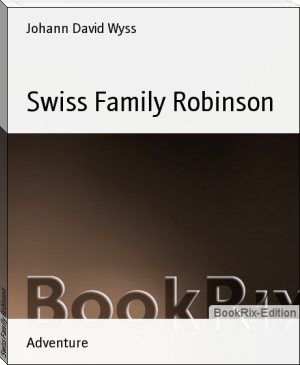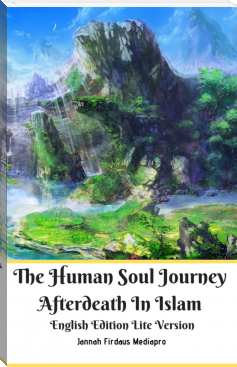Swiss Family Robinson - Johann David Wyss (poetry books to read txt) 📗

- Author: Johann David Wyss
- Performer: -
Book online «Swiss Family Robinson - Johann David Wyss (poetry books to read txt) 📗». Author Johann David Wyss
himself made a face at the peculiar flavour of the meat.
`It is the musk which you taste,’ said I; and I described to them the
various animals in which this strange liquid is found; the musk deer,
musk ox, crocodile, muskrat of India (also called soudeli, which taints
a corked bottle of wine, if it only runs across it) concluding with an
account of the civet, also called civet-cat.
`The civet,’ said I, `is a handsome black and white animal, and the
perfume obtained from it was formerly considered a valuable medicine;
in the present day it is used chiefly as a scent. This odoriferous
substance is secreted, i.e., formed, in a double glandular pouch near
the tail, and the Dutch keep the creature in captivity, so that it
shall afford them a continual supply.
`The method of removing the civet perfume is ingenious. The animal is
very quick and elastic in its movements, and having sharp teeth it is
not pleasant to handle. So it is put into a long, narrow cage in which
it cannot turn around, a horn spoon is then introduced, and the
perfume, a thick, oily stuff something like butter, is coolly scraped
from the pouch, the plundered civet being then released from strait
durance, until the supply is re-formed.’
Presently Jack ran for his game-bag, producing some fruit which he had
forgotten. Several pale green apples, quite new to us, excited general
attention.
`Why, what are those? Are they good?’ I asked.
`I hope so,’ said Jack, `but Fritz and I were afraid of eating some
awful poison or other, like the manchineel, so we brought them for the
inspection of the learned Master Knips.’
I took one and cut it in two, remarking that it contained a circle of
seeds or pips, instead of the stone of the manchineel.
At that moment Knips slyly came behind me, and snatching up one half,
began to munch it with the liveliest satisfaction, an example which the
boys were so eager to follow that a general scramble ensued, and I had
some trouble in securing a couple of the apples for myself and their
mother.
I imagined this to be the cinnamon apple of the Antilles.
Everyone seeming wearied by the fatigues of the day, our mattresses and
pillows were arranged, and the inmates of Woodlands betook themselves
to repose.
With early light we commenced the next day’s journey, directing our
course to a point between the sugar-brake and the Gap, where we had
once made a sort of arbour of the branches of trees; as this remained
in pretty good condition, we spread a sailcloth over the top of it,
instead of pitching the tent, and made it very comfortable quarters for
the short time I proposed to stay there.
Our object being to search the neighbourhood for traces of the boa
constrictor, or any of his kindred, Fritz, Jack, and Franz went with me
to the sugarcane brake, and we satisfied ourselves that our enemy had
not been there. It was long since we had enjoyed the fresh juice of
these canes, and we were refreshing ourselves therewith, when a loud
barking of dogs and loud rustling and rattling through the thicket of
canes disturbed our pleasant occupation, and, as we could see nothing a
yard off where we stood, I hurried to the open ground, and with guns in
readiness we awaited what was coming.
In a few minutes a herd of creatures like little pigs issued from the
thicket, and made off in single file at a brisk trot; they were of a
uniform grey colour, and showed short sharp tusks.
My trusty double-barrel speedily laid low two of the fugitives which I
felt certain to be peccaries; the others continued to follow the leader
in line, scarcely turning aside to pass the dead bodies of their
comrades, and maintaining the same steady pace, although Fritz and Jack
also fired and killed several.
I felt certain that these were peccaries, and recollected that an
odoriferous gland in the back must be removed immediately, otherwise
the meat will become tainted, and quite unfit to eat.
This operation, with the help of my boys, I accordingly performed at
once.
Presently, hearing shots in the direction of the hut where we had left
Ernest and his mother, I sent Jack to their assistance, desiring him to
fetch the cart, that the booty might be conveyed to our encampment,
employing the time of his absence in opening and cleaning the animals,
thus reducing their weight.
Ernest came back with Jack and the cart, and told us that the
procession of peccaries had passed near the hut, and that he, with
Juno’s help, had secured three of them.
I was glad to hear this, as I had determined to cure a good supply of
hams, and we made haste to load the cart; the boys adorned it with
flowers and green boughs, and with songs of triumph which made the
woods ring they conveyed the valuable supply of game to the hut, where
their mother anxiously waited for us.
After dinner we set to work upon our pigs, singeing and scalding off
the bristles; I cut out the hams, divided the flitches, bestowed
considerable portions of the carcase on the dogs, and diligently
cleansed and salted the meat, while the boys prepared a shed, where it
was to be hung to be cured in the smoke of fires of green wood.
This unexpected business of course detained us in the place for some
time. On the second day, when the smoking-shed was ready, the boys were
anxious to cook the smallest porker in the Otaheitean fashion. For this
purpose they dug a hole, in which they burnt a quantity of dry grass,
sticks and weeds, heating stones, which were placed round the sides of
the pit.
While the younger boys made ready the oven, Fritz singed and washed his
peccary, stuffing it with potatoes, onions and herbs, and a good
sprinkling of salt and pepper.
He then sewed up the opening, and enveloped the pig in large leaves to
guard it from the ashes and dust of its cooking-place.
The fire no longer blazed, but the embers and stones were glowing hot;
the pig was carefully placed in the hole, covered over with hot ashes,
and the whole with earth, so that it looked like a big mole heap.
Dinner was looked forward to with curiosity, as well as appetite; my
wife, as usual, distrusting our experiments, was not sanguine of
success, and made ready some plain food as a pis aller*.
* Last resort, backup, poor substitute.
She was well pleased with the curing-hut, which was roomy enough to
hang all our hams and bacon. On a wide hearth in the middle we kindled
a large fire, which was kept constantly smouldering by heaping it with
damp grass and green wood. The hut being closed in above, the smoke
filled it, and penetrated the meat thoroughly: this process it had to
undergo for several days.
In a few hours Fritz gave notice that he was going to open his oven.
Great excitement prevailed as he removed the earth, turf, and stones,
and a delicious appetizing odour arose from the opening. It was the
smell of roast pork, certainly, but with a flavor of spices which
surprised me, until I thought of the leaves in which the food had been
wrapped up.
The peccary was carefully raised, and when a few cinders were picked
off, it looked a remarkably well-cooked dish. Fritz was highly
complimented on his success, even by his mother.
The scented leaves were, I thought, those of a tree which I knew to be
found in Madagascar, called by the natives ravensara, or ‘good leaf.’
It is said to combine the scent of the nutmeg, clove, and cinnamon. The
fruit is a species of nut, possessing the scent of the leaves in a more
delicate degree, and from it an oil or essence is distilled, which is
highly valued in native cookery.
During the process of curing our large supply of hams and bacon, which
occupied several days, we roamed about the neighbourhood in all
directions, finding no trace of the serpent, but making many valuable
acquisitions, among which were some gigantic bamboos from fifty to
sixty feet in length, and of proportionate thickness. These, when cut
across near the joints, formed capital casks, tubs, and pots; while the
long sharp thorns, which begirt the stem at intervals, were as strong
and useful as iron nails.
One day we made an excursion to the farm at Prospect Hill, and were
grievously provoked to find that the vagabond apes had been there, and
wrought terrible mischief, as before at Woodlands.
The animals and poultry were scattered, and everything in the cottage
so torn and dirtied, that it was vain to think of setting things right
that day. We therefore very unwillingly left the disorder as we found
it, purposing to devote time to the work afterwards.
When all was in readiness for the prosecution of our journey, we
closed and barricaded the hut, in which, for the present, we left the
store of bacon; and arranging our march in the usual patriarchal style,
we took our way to the Gap, the thorough defence of which defile was
the main object we had in view.
Our last halting-place being much enclosed by shrubs, bamboos and
brushwood, we had during our stay opened a path through the cane
thicket in the direction we were about to travel; this we now found of
the greatest assistance, and the loaded cart passed on without
impediment.
The ground was open and tolerably level beyond, so that in a few hours
we arrived at the extreme limit of our coast territory.
We halted on the outskirts of a little wood behind which, to the
right, rose the precipitous and frowning cliffs of the mountain gorge,
while to the left flowed the torrent, leaving between it and the rocks
the narrow pass we called the Gap, and passing onward to mingle its
waters with the sea.
The wood afforded us pleasant shelter and standing high, and within
gunshot of the mouth of the rocky pass, I resolved to make it our
camping-place. We therefore unpacked the cart, and made our usual
arrangements for safety and comfort, not forgetting to examine the wood
itself, so as to ascertain whether it harboured any dangerous animals.
Nothing worse than wild cats was discovered. We disturbed several of
these creatures in their pursuit of birds and small game, but they fled
at our approach.
By the time dinner was ready we felt much fatigued, and some hours of
unusually sultry and oppressive heat compelled us to rest until towards
evening, when returning coolness revived our strength. We pitched the
tent, and then occupied ourselves with preparations for the next day,
when it was my intention to penetrate the country beyond the defile,
and make a longer excursion across the savannah, than had yet been
undertaken.
All was ready for a start at an early hour; my brave wife consented to
remain in camp with Franz as her companion, while the three elder boys,
and all the dogs, except Juno, went with me.
We expected to find it somewhat difficult to make our way through the
narrowest part of the pass, which had been so strongly barricaded and
planted with thorny shrubs, but found on the contrary that the fences
and walls were broken down and disarranged. It was thus very evident
that the great snake, as well as the herd of peccaries, had made an
entrance here.
This barricade





Comments (0)